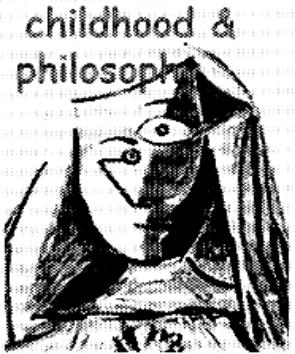kant’s common human understanding in the community of philosophical inquiry
DOI:
https://doi.org/10.12957/childphilo.2025.88799Keywords:
community of philosophical inquiry, immanuel kant, common human understanding, p4cAbstract
This article explores the intersection of Immanuel Kant’s maxims of common human understanding and the Community of Philosophical Inquiry (CPI). Kant’s three maxims—thinking for oneself, considering others' perspectives, and maintaining logical consistency—are foundational to philosophical reasoning and education. The CPI framework, originally developed by Matthew Lipman and Ann Margaret Sharp, encourages critical, creative, and collaborative thinking among children. The study examines how CPI aligns with Kant’s ideals, fostering intellectual autonomy, perspective-taking, and systematic reasoning in education. Drawing from John Dewey’s pragmatism and Walter Benjamin’s insights on childhood imagination, the article highlights how CPI integrates independent thinking and collective dialogue to cultivate critical reflection and ethical awareness. Moreover, the paper argues that CPI can be an effective pedagogical model for addressing contemporary challenges such as misinformation, political polarization, and civic disengagement. Through open-ended discussions, students learn to critically evaluate information, challenge assumptions, and develop social responsibility. By implementing CPI methodologies, educators can create inclusive learning environments that promote inquiry, intellectual integrity, and democratic engagement. This synthesis suggests that Kant’s philosophical principles, when applied through CPI, can enhance modern education by fostering individuals who are not only rational thinkers but also socially responsible citizens capable of constructive dialogue and ethical decision-making.
Downloads
References
Cam, P. (2011). Pragmatism and the community of inquiry. childhood & philosophy, 7(13), 103–119.
Fisherman, D. (2011). Thinking as two - philosophy, critical thinking, and community of inquiry. childhood & philosophy, 6(12), 211–227.
Gregory, M. R. (2007). A framework for facilitating classroom dialogue. Teaching Philosophy, 30(1), 59–84.
Hartnack, J. (1967). Kant’s theory of knowledge: an introduction to the Critique of Pure Reason. Hackett Publishing Company.
Kant, I. (1998). Critique of pure reason (2nd ed., P. Guyer & A. W. Wood, Trans.). Cambridge University Press.
Kant, I. (1987). Critique of judgement (W. S. Pluhar, Trans.). Hackett Publishing Company.
Kennedy, D. (2011). Thinking for oneself and with others. In: Philosophical dialogue with children: essays on theory and practice. The Mellen Press.
Lipman, M. (2003). Thinking in education (2nd ed). Cambridge University Press.
Nascimento, A. M. (2022). Walter Benjamin: “infância, uma experiência devastadora”. childhood & philosophy, 18, 1–24.
Sharp, A. M. (1987). What is a ‘community of inquiry’? Analytic Teaching, 8(1), 13–18.
Université de Montréal. (n.d.). Community of Philosophical Inquiry. Institut Philosophie Citoyenneté Jeunesse (IPCJ). Retrieved May 22, 2025, from https://ipcj.umontreal.ca/english/about/pedagogical-approaches/community-of-philosophical-inquiry/



